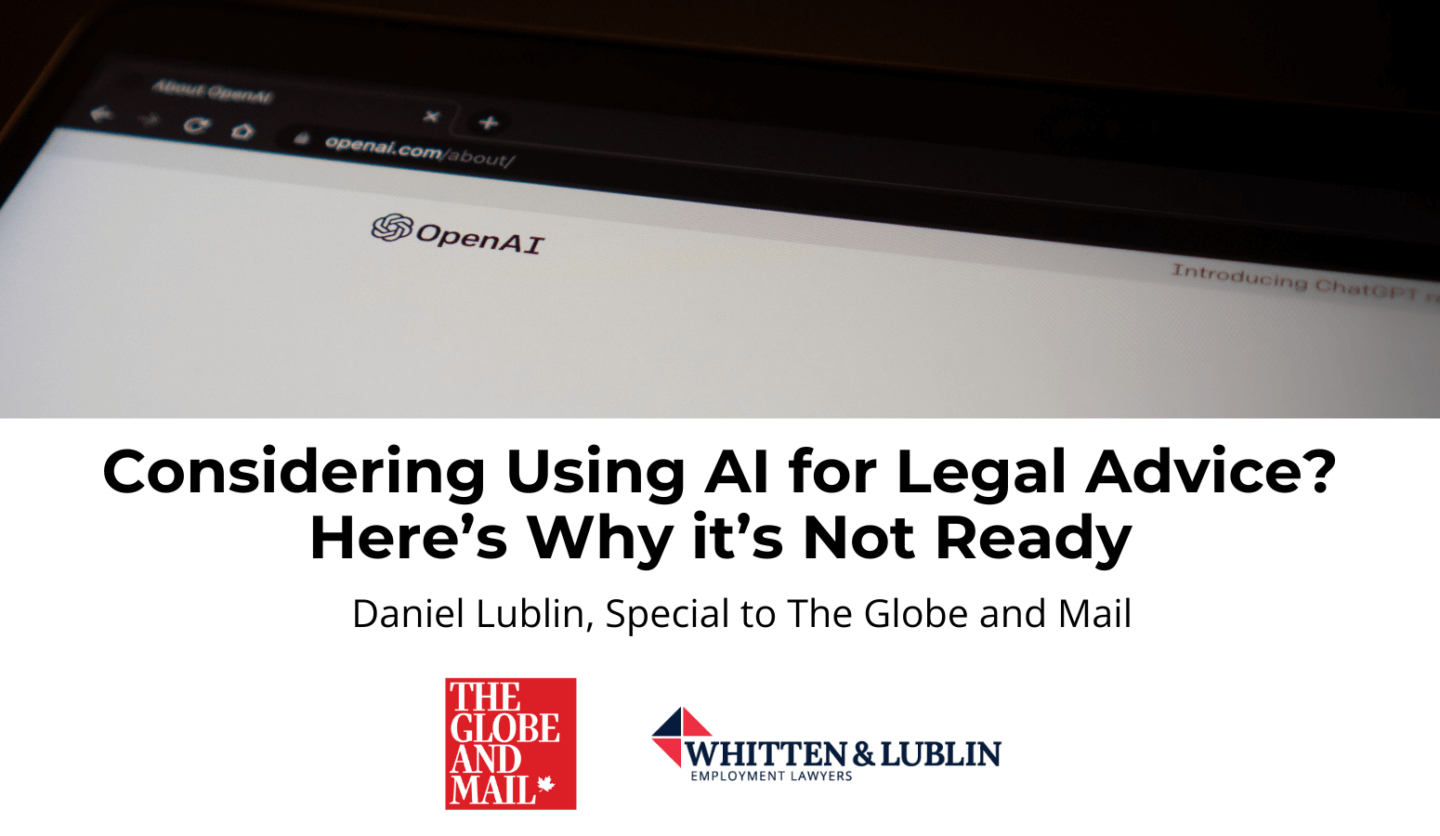
Considering Using AI for Legal Advice? Here’s Why it’s Not Ready
Published By: THE GLOBE AND MAIL
Why pay for a lawyer’s advice when you can find it online for free? This sentiment will inevitably gain traction as the artificial intelligence ecosystem evolves and chatbots or other tools become more widely known and readily available. However, when it comes to using AI for certain legal disputes, the problem is there are few checks and balances to ensure the information is accurate or that you are interpreting it in the intended manner. As Canadians embrace technological innovation, it’s imperative to first pause and consider the risks and limitations.
Confusing advice with information: AI chatbots, such as ChatGPT or its counterparts, do not provide legal advice, although many people will mistakenly assume otherwise. Because computer-generated responses mimic human interaction, people may easily confuse general information and simplistic recommendations as sound legal strategy. Consequently, they may more easily ignore any express warnings or qualified answers.
False claims: ChatGPT’s creator, OpenAI, explains that the software will occasionally make up facts or “hallucinate” outputs, meaning that some proportion of computer-generated answers are simply inaccurate. This risk is heightened in the legal realm, where the facts, data and precedents need to be accurately described.
Recently, a New York lawyer was sanctioned for using ChatGPT to write a submission for a judge in a large personal injury case. Unbeknownst to the lawyer, his filings referenced non-existent court decisions, a result of ChatGPT conjuring legal precedents out of thin air.
It is one thing to ask a chatbot to explain a legal concept, but quite another to use it to prepare an employment contract, a legal demand letter or any other important legal document.
Self-diagnosis: A major problem with relying upon AI as a substitute for a professional’s advice is that AI-generated answers depend entirely upon the precise instructions the software is given. Thus, if you ask any chatbot the wrong question, you will invariably obtain the wrong answer. In other words, you may be leading yourself astray.
Identifying the correct issues in any workplace legal dispute and predicting which of those issues is most likely to carry the day in court is where a lawyer’s experience comes into play. Legal outcomes often hinge upon the intricate interpretation of contractual clauses, statutes, past precedents and an acute understanding of the human behaviour of the parties involved. Mistakenly presuming a manager’s behaviour constitutes bullying or harassment or that a job transfer equates to a demotion, will cause any chatbot to reach inaccurate conclusions about the strength of your claim.
A cornerstone of the legal profession is the application of legal principles to real-world situations. If you get this part wrong, no software or technology can remedy it for you.
Insurance and regulation: If a legal professional provides faulty advice or misses a crucial step in your matter, you can sue that lawyer for negligence. All lawyers carry mandatory insurance, which compensates malpractice claims victims, even if the lawyer cannot personally afford to do so.
Similarly, all Canadian lawyers and paralegals are regulated by provincial bodies with codes of conduct designed to safeguard the public interest and to ensure that members meet admission and ongoing ethical and competency standards. If a lawyer or paralegal’s conduct runs afoul of any of the rules, any member of the public can file a complaint to their governing body and participate in an open disciplinary process. Presently, there is no such regulation surrounding any form of AI.
Without insurance and regulation, the public lacks recourse to sue for damages or file complaints about misleading, biased or defamatory information, or if misinterpreting that information jeopardizes your case or your job.
Restraint: One of the main functions of any expert is to provide a good sounding board. It is easy to envision a multitude of scenarios where workers attempt to use AI to resolve a workplace dispute before soliciting the guidance of a lawyer. While AI can serve as a valuable tool and provide a decent ballpark assessment, relying too much on technology, in the absence of a professional’s advice, may lead many to mistakenly try to take matters into their own hands. This is where the biggest risk lies. Throughout my years of experience, I’ve learned that discerning when not to pursue a legal case and understanding the reasons behind it can often be the most invaluable advice a lawyer can offer.
Daniel A. Lublin is a partner at Whitten & Lublin, representing both employers and employees in workplace legal disputes. He can be reached at [email protected].
Author – Daniel Lublin



